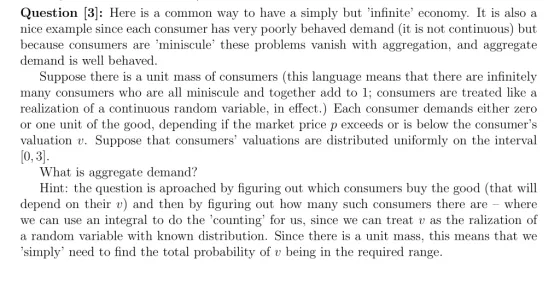Answered step by step
Verified Expert Solution
Question
1 Approved Answer
Question [3]: Here is a common way to have a simply but 'infinite' economy. It is also a nice example since each consumer has

Question [3]: Here is a common way to have a simply but 'infinite' economy. It is also a nice example since each consumer has very poorly behaved demand (it is not continuous) but because consumers are 'miniscule' these problems vanish with aggregation, and aggregate demand is well behaved. Suppose there is a unit mass of consumers (this language means that there are infinitely many consumers who are all miniscule and together add to 1; consumers are treated like a realization of a continuous random variable, in effect.) Each consumer demands either zero or one unit of the good, depending if the market price p exceeds or is below the consumer's valuation v. Suppose that consumers' valuations are distributed uniformly on the interval [0,3]. What is aggregate demand? Hint: the question is aproached by figuring out which consumers buy the good (that will depend on their u) and then by figuring out how many such consumers there are - where we can use an integral to do the 'counting for us, since we can treat v as the ralization of a random variable with known distribution. Since there is a unit mass, this means that we 'simply need to find the total probability of v being in the required range.
Step by Step Solution
★★★★★
3.51 Rating (158 Votes )
There are 3 Steps involved in it
Step: 1
Aggregate demand is equal to the number of consumers whose valuation v exceeds ...
Get Instant Access to Expert-Tailored Solutions
See step-by-step solutions with expert insights and AI powered tools for academic success
Step: 2

Step: 3

Ace Your Homework with AI
Get the answers you need in no time with our AI-driven, step-by-step assistance
Get Started


